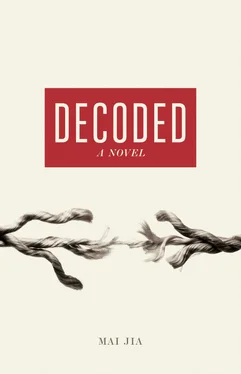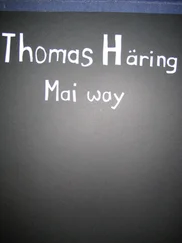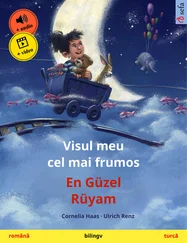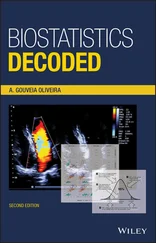Mai Jia - Decoded
Здесь есть возможность читать онлайн «Mai Jia - Decoded» весь текст электронной книги совершенно бесплатно (целиком полную версию без сокращений). В некоторых случаях можно слушать аудио, скачать через торрент в формате fb2 и присутствует краткое содержание. Год выпуска: 2014, Издательство: Allen Lane, Жанр: Современная проза, на английском языке. Описание произведения, (предисловие) а так же отзывы посетителей доступны на портале библиотеки ЛибКат.
- Название:Decoded
- Автор:
- Издательство:Allen Lane
- Жанр:
- Год:2014
- ISBN:нет данных
- Рейтинг книги:3 / 5. Голосов: 1
-
Избранное:Добавить в избранное
- Отзывы:
-
Ваша оценка:
- 60
- 1
- 2
- 3
- 4
- 5
Decoded: краткое содержание, описание и аннотация
Предлагаем к чтению аннотацию, описание, краткое содержание или предисловие (зависит от того, что написал сам автор книги «Decoded»). Если вы не нашли необходимую информацию о книге — напишите в комментариях, мы постараемся отыскать её.
Decoded — читать онлайн бесплатно полную книгу (весь текст) целиком
Ниже представлен текст книги, разбитый по страницам. Система сохранения места последней прочитанной страницы, позволяет с удобством читать онлайн бесплатно книгу «Decoded», без необходимости каждый раз заново искать на чём Вы остановились. Поставьте закладку, и сможете в любой момент перейти на страницу, на которой закончили чтение.
Интервал:
Закладка:
As I have said before, Jinzhen was sent to us by God to research this subject. In the past I have been worried that we would be unable to provide him with the quite the surroundings that he needs, not to mention the support that would carry him through all the difficulties that he will face. However, I now believe we can give him the right circumstances in which to carry on his work and space in which to breathe: Princeton University. There is a joke in your country about the girl who sews a wedding gown for another bride to wear — maybe one day people will discover that all the work Paul Samuelson’s group has put in has achieved nothing but cutting the cloth for a Chinese bride. .
Young Lillie read this letter in a break between undergraduate classes. While he was reading it, the loudspeaker just outside the window was playing a popular song at top volume:
With heads held high,
Grinning in the teeth of danger,
We cross the Yalu River.
The newspaper he had just been looking at was lying on the table in front of him — the headline was one of the political slogans of the day: ‘American Imperialism Is a Paper Tiger’. Listening to the rousing words of the song, looking at the heavy black ink of the headline, he felt completely helpless. He had no idea what he should say to his faraway correspondent — he was also more than a little frightened, as if there was some other person, hidden in the shadows, who was waiting for him to write back. At that time he was the vice-chancellor of N University, but he was also the deputy mayor of C City. That was the reward the People’s Republic of China had given the Rong family for their many years of devotion to science, learning and patriotism over the course of several generations. This was the happiest time of his life — he wasn’t the kind of person to care for nothing but personal aggrandizement, but he wouldn’t have been human if he didn’t enjoy it. The Rong family had been going through a long period of decline, but now the good days were back again — he was treasuring every minute of it. It was only the fact that he had very much the air of an ivory-tower intellectual that made people imagine that he did not appreciate his present good fortune.
In the end, Young Lillie did not write back to Jan Liseiwicz. He took Liseiwicz’s letter and two newspapers full of coverage of the bloody battles between the American Army and the Chinese People’s Volunteer Army in Korea to Jinzhen, and told him to write back to the man.
He said, ‘Thank him, but tell him that you can’t leave because of the Korean War. I am sure that he will be very sad that things ended like this: I am too, but the person who has lost the most here is you. I think that God wasn’t on your side here.’
Later on, when Jinzhen handed him the draft of the letter and asked him to have a look, the old man seemed to have forgotten his earlier advice. He struck through about half of the text, which expressed regret and disappointment — the remainder was given back to Jinzhen with further instructions: ‘You had better clip some of the newspaper reports and send them to him along with your letter.’
That was in the spring of 1951.
After Chinese New Year, Jinzhen went back to class. Of course, he didn’t go to Stanford, or to Princeton, but back to N University. When Jinzhen dropped his carefully worded letter and a couple of newspaper reports that he had clipped into the postbox, he was confining one of the paths that his life might have taken to history. As Master Rong said, some letters record history while others make it: this was a letter that changed one person’s entire life. [Transcript of the interview with Master Rong]
Before Zhendi went back to class, Daddy discussed with me whether he should go back to rejoin his original class or whether he should start again as a freshman. I knew that Zhendi had fantastic grades as a student, but he had only spent a total of three weeks in class; what is more he had just recovered from a life-threatening illness — he could not possibly cope with a heavy workload. I was afraid that sending him to join the third-year classes would put too much pressure on him so I suggested that he re-enrol as a freshman. However, in the end he did not have to start again from the beginning; the university allowed him to rejoin his original classmates. Zhendi wanted it that way himself. To this day, I remember what he said: ‘God wanted me to become sick so that I would be forced to spend some time away from science books — He was worried that I might become their prisoner and lose my way creatively — in which case I would never have achieved anything.’
A weird thing to say, don’t you think? So bizarre as to almost seem a bit mad?
The fact is that Zhendi had previously suffered from very low selfesteem, but getting so sick seemed to have changed him. In actual fact, the thing that really changed him was the books that he read, a huge number of books that were nothing to do with mathematics. While he was at home recovering, he read all my books and all Daddy’s books, particularly the fiction. He read them very quickly and in a very strange way — some books he would pick up, flick through a few pages and then put them straight back again. Some people imagined that he was actually reading the books from cover to cover in that time and so they called him Little Tuk, after the H. C. Anderson character who learns his lessons by putting his schoolbooks under his pillow at night. That was ridiculous, of course. He did read very quickly, it is true — the majority of books that he took from our shelves were back within twenty-four hours. The fact is that reading quickly is related to reading a lot; the more you read, the more you know and then the quicker you read the next thing. As he read more and more books related to topics beyond the subject he was studying at university, the less interested he was in the things written in his textbooks. That is why he started to cut classes — sometimes he even cut my classes. At the end of the first term after his resumption of study, both his grades and the number of classes that he had missed were quite eye-opening: he was the top of the class and by a very long way. Another thing that he was way ahead of his classmates in was the number of books he borrowed from the university library — in one term he had borrowed more than two hundred books in subjects ranging from philosophy to literature, economics, art, military science — there was all kinds of stuff in there. It was for this reason that during the summer holidays, Daddy took him up to the attic and opened up our storeroom. Pointing to the two cases of books that Liseiwicz had left behind, he said: ‘These aren’t ordinary textbooks. Liseiwicz left them. In the future when you don’t have anything else to do, why don’t you read them? I am afraid though that you may not understand them.’
Another term passed and then in about March or April of the following academic year, Zhendi’s classmates all started working on their graduation theses. It was at around this time that a couple of the other professors in the same department came to see me, because they thought that there was a problem with the subject that Zhendi had chosen. They were hoping that I would speak to him, that I would find a way to persuade him to pick another topic. Otherwise it was going to be impossible for any of them to supervise his graduation thesis. I asked what topic he had picked and they said it was a political problem.
Zhendi had decided that he wanted to write his thesis based on a theory propounded by the famous mathematician Georg Weinacht concerning the binary nature of certain constants. The topic was to be structured around coming up with a mathematical proof for this theory. The thing is that Georg Weinacht was famous at that time in the mathematical community for his anti-communist stance — it was said that he had a notice pinned to the door of his office saying, ‘No Communists or Fellow Travellers Beyond This Point’. At the time of the most appalling carnage during the Korean War, he went on record encouraging the American Army to cross the Yalu River. I know that science is international and knows no borders, and that it is not affected by any ‘ism’, but Weinacht’s powerfully anti-communist stance did overshadow his mathematical theories and give them a political dimension. At that time, there were a number of communist countries, led by the Soviet Union, where the validity of his theories was not admitted and his work was not even mentioned — if it did come under discussion, it was the subject of much criticism. If Zhendi was hoping to prove one of his theories that would very much run counter to the tide. It was a very sensitive topic and would be seen as having dangerous political implications.
Читать дальшеИнтервал:
Закладка:
Похожие книги на «Decoded»
Представляем Вашему вниманию похожие книги на «Decoded» списком для выбора. Мы отобрали схожую по названию и смыслу литературу в надежде предоставить читателям больше вариантов отыскать новые, интересные, ещё непрочитанные произведения.
Обсуждение, отзывы о книге «Decoded» и просто собственные мнения читателей. Оставьте ваши комментарии, напишите, что Вы думаете о произведении, его смысле или главных героях. Укажите что конкретно понравилось, а что нет, и почему Вы так считаете.












